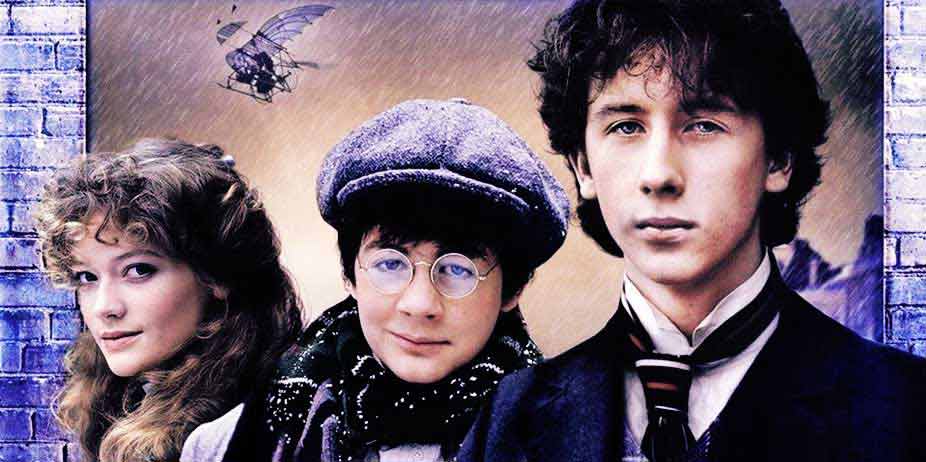Young Sherlock Holmes (1985)
Most Sherlockians will find Sherlock Holmes best situated in his study at 221B Baker Street, violin in one hand, pipe in the other. And in many modern adaptations of Doyle's classics, this is where you will indeed find him. However, Young Sherlock Holmes is a film that dares to suggest otherwise. Like many other productions it risks delving into the detective's past and unearthing the source for many of his ideas, characteristics, and reasoning skills, from the deerstalker and cape to the pipe, his unexplainable mistrust of women, and even his arch-nemesis Professor Moriarty.
The story opens in the fog-shrouded streets of London as a gentle tinkling of bells is heard, and a dark shadow passes. An older man is seated at a roadside cafe awaiting his dinner. Something tiny shoots through the air, embedding into the man's neck. He then, to the astonishment and horror of all involved, goes insane with strange, nightmare-like hallucinations that eventually lead to his suicide by leaping out of an upper window in his flat. Young John Watson's school has been forced to close due to lack of funds and he's been sent to the school of Brampton in London. On his first day he meets a peculiar, eccentric, and unbelievably intelligent fellow schoolboy by the name of Sherlock Holmes (Nicholas Rowe). The two become inseparable in the weeks that pass. Holmes is soon drawn to a strange series of events that seem to follow unexplainable suicides and carriage accidents all over the city. First it was a wealthy baronet in the upper end. Then a local clergyman.
Retired schoolmaster and mentor to Holmes, Professor Waxflatter (Nigel Stock) also has a vast interest in the case. He's kept the men's obituaries, although denies having any association with either man. Waxflatter's niece Elizabeth (Sophie Ward) is a close friend of Holmes, which encourages jealousy among some of the other schoolboys. With a well-timed "accident" one of the boys manages to get Holmes permanently expelled from Brampton for cheating. Although Holmes is believed to have left, he returns in secret to investigate the murders. Watson (Alan Cox) and Elizabeth become his willing (and sometimes unwilling) accomplices in an investigation that will involve them all in the most deadly case of Holmes' long career. The clues are sparse: a strange blowpipe, a whispered name, the tinkling of bells, the danger is larger than life, and the villain may be closer than any of them could ever imagine.
Clearly this film was aimed for young adults, and they'll thoroughly enjoy it. Nicolas Rowe, cast as young Sherlock, is exceptional in his role, even fitting the physical description: tall, lanky, long-fingered, gray-eyed and sharp of feature. He manages to play the light jesting of Holmes well, offsetting with excellent emotions of anger, sorrow, even physical strength. Fans will be captivated by one element in particular of Young Sherlock Holmes that deserves attention: it's one of the few film adaptations ever to feature Holmes as a swordsman. Watson alluded to Holmes' swordsmanship abilities once or twice in the Canon. Here we get to see a spectacular bout staged in memorable surroundings. In conclusion, it plays a bit like Sherlock Holmes and the Temple of Doom might. With an element of suspended reality, despite the weird premise and creepy visual effects, the film is an enjoyable adventure that many will enjoy for to its interesting tie-ins with the Canon. One final note. Watch past the ending credits. There is a shocking surprise involved for those familiar with Doyle's stories.
Sexual Content:
None.
Language:
Mild profanities (damn, hell).
Violence:
People are drugged and buried alive / mummified
while still alive. A person is shot and killed. A person
drowns beneath the ice.
Other:
The film unfolds swiftly amidst shots of creepy
hallucinations and Indiana Jones-like
special effects. A roasted bird, skeletons, pastries, a stained
glass window, gargoyles, and wall decor come to life to
attack the victims. The interesting aspect shown in the
midst of these hallucinations is that each presumably are
brought on by the victim's worst fears: Holmes' are not
violent or terrifying but of a psychological nature,
involving his parents and alluding to family secrets and
problems. Perhaps this is the way of the scriptwriter in
attempting to explain Holmes' fascination for cocaine, a
drug that relaxes the body but stirs the mind. The film also
does an excellent job of explaining some of the
aforementioned unsolved mysteries of his past, such as his
aversion to women.

